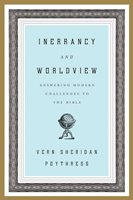Today we conclude our interview with Dr. Vern Poythress of Westminster Theological Seminary concerning his book, Inerrancy and Worldview: Answering Modern Challenges to the Bible. If you missed the first part of this interview yesterday, you can see it here.
Books At a Glance (Fred Zaspel):
Many people believe that faith and science are at war. What are some basic points for Christians to keep in mind about the relationship between science and the Christian worldview?
Poythress:
There are several points to keep in mind. First, Christianity affirms the value of science. Genuine work in science actually fits well within a Christian worldview. God made the world and specifies its regularities. “Scientific law” is a name for the regularities. There are laws, and we can hope to understand them because we are made in the image of God who devised the laws. By contrast, it is hard to give an account that makes sense of law within a materialistic or atheistic context.
Second, science like all other human endeavors gets corrupted by human sin. And the corruptions can be subtle. One form of corruption is the replacement of God with an impersonalistic conception of scientific law as a cosmic mechanism. Then, there can be no exceptions – no miracles, no exceptional origin for the first life, and no exceptional origin for the human race.
Third, the practice of science has a corporate dimension, and this is both good and bad. It is good because we can learn from each other and build on each another’s insights. It is bad because a whole group can go astray together, and then they reassure one another that all is well. That has happened with the growth of an impersonalistic conception of natural law. We see some of the effects of corporate re-inforcement of conformity when mainstream biologists repudiate intelligent design. Advocates of intelligent design are not hired, or are fired, or vilified, or misrepresented in order to preserve what mainstream science sees as its comforting consensus in favor of an impersonalistic conception of biological evolution.
Books At a Glance:
Besides science, what other academic fields do you see as potentially creating challenges for biblical inerrancy?
Poythress:
Earlier I mentioned social anthropology and related fields devoted to cultural analysis. In addition, historical study has been a challenging area since the nineteenth century at least. And the twentieth century has seen the rise of structural linguistics, philosophy of language, schools of psychology and psychotherapy, and various critical studies concerning ideologies. I touch on each of these fields in the different subdivisions of my book. All these fields are affected by the impersonalistic atmosphere characteristic of prevailing modern worldviews. Academic studies treat the world as if God is nonexistent or absent. And then the impersonalistic assumptions in academic studies generate clashes when people undertake academic study of the Bible.
 Books At a Glance:
Books At a Glance:
If you had to sketch a brief response to someone endorsing the claim that the Bible is infallible but not inerrant what points would you include?
Poythress:
Earlier in the history of theology, the word infallible was actually a stronger word than inerrancy, when it was used to affirm the trustworthiness of the Bible. For the Bible to be infallible means that it cannot fail, not merely that it does not fail. And the failure to be truthful would be one form of failure. Next, to say that the Bible is inerrant is to say that is has no errors, that is, that is never fails to be truthful. Thus, infallibility implies inerrancy. But infallibility is stronger than that. Infallibility means not only that the Bible has no actual errors, but that it could not have any errors. It is not even possible, given that the Bible is the very speech of God.
Unfortunately, in the course of time the word infallible began to be used in another way. Some people said that the Bible could have errors in science, history, or geography – that is, in ordinary matters of fact. But they said that the Bible was nevertheless “infallible” because it did not fail to achieve its purpose, which was allegedly to teach theology and morality. There were other variations than defined in other ways what some people thought was the “purpose” of the Bible, and therefore also the respects in which it did not fail.
My first observation about these alternatives is that the Bible itself never makes a distinction of this kind. It never suggests that it is only reliable when it happens to speak on certain topics. It never says that it only becomes the voice of God now and then, when it addresses these reserved topics. Rather, the Bible is the voice of God all the way through. And God can address whatever topics he desires. He is, after all, Lord of all. And he demands our allegiance to him in all areas of life.
So we can observe that these modern alternative uses of the word infallible really boil down in practice to saying that the Bible is neither infallible nor inerrant across the board, but can only be trusted when its speaks on certain subjects. And then of course it is up to the interpreter as to where he draws the line about what can be trusted. In the long run, and in practice, this procedure destroys the authority of the Bible. It is in deep conflict with what the Bible says about itself. In particular, it is in conflict with what Jesus teaches about the Old Testament.
Since the nature of error is often misunderstood by critics of inerrancy, I should add that inerrancy does not mean that the Bible must always be pedantically precise. For example, the Bible does not include mounds of information about every detail in every historical episode that it describes. But in what it does say it provides us with a true account. A truthful statement, like “Paris is the capital of France,” does not need to provide us with all possible information about Paris or France in order to count as true. Likewise, the Bible does not need to provide us with massive information about Josiah in order for it to be true that “Josiah was eight years old when he began to reign” (2 Kings 22:1). Many books on inerrancy have made this point eloquently, but it continues to be misunderstood.
Books At a Glance:
Is your book written primarily for Christians? If so, do you think it is relevant for non-Christians as well?
Poythress:
Yes, I wrote primarily for Christians, because Christians are the ones most concerned about whether the Bible is inerrant and how the Bible relates to modern culture. But I think my main points are relevant for non-Christians as well. If a non-Christian reads the Bible, he is going to find things that look like errors and things that he misunderstands. I am advising the non-Christian to understand that the Bible has to be interpreted against the background of its own personalistic worldview. This advice is not the same as asking non-Christians actually to abandon the assumptions that they have from their own worldviews. I am asking them to distinguish their assumptions from a biblical worldview and to realize that the Bible will make sense to them only when considered carefully in the context of a biblical worldview. This point is relevant also when Christians try to explain the Christian faith to outsiders. Attention to the assumptions involved in worldviews can help outsiders understand what the claims of Christianity actually are, in distinction from what they are taken to be when an alien worldview distorts them.
Books At a Glance:
Thanks so much for your time. Do you have any further writing projects currently that we might keep a watch for?
Poythress:
I have several books in progress: Chance and the Sovereignty of God: A God-Centered Approach to Probability and Random Events; Redeeming Philosophy: A God-Centered Approach to the Big Questions; Redeeming Mathematics: A God-Centered Approach; and some whose titles are not as fixed: A Handbook for Biblical Hermeneutics; The Miracles of Jesus. There is also a booklet coming: Did Adam Exist? (for which see here).

